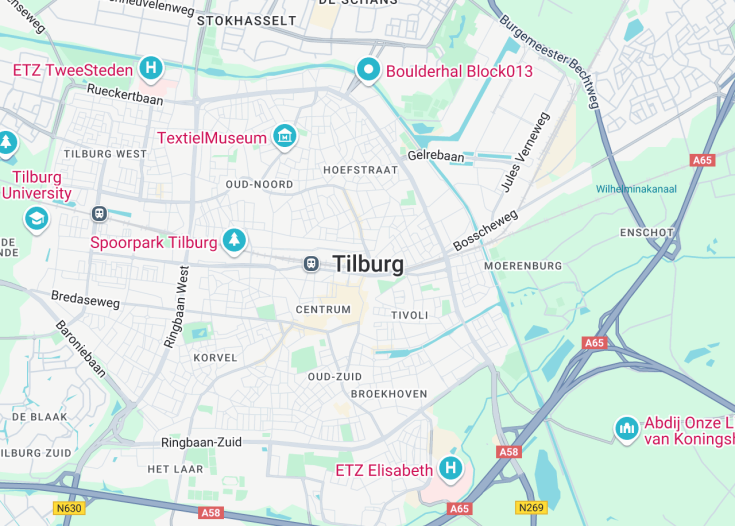Located in the heart of the Netherlands, Tilburg is a vibrant city that exudes a rich tapestry of culture, history, and modernity. Known for its lively cultural festivals, extensive green parks, and dynamic market, Tilburg offers a unique blend of traditional Dutch heritage with contemporary lifestyle. The city is also home to Tilburg University, adding a youthful energy to its historic streets. Whether you’re exploring its renowned museums, enjoying its bustling cafés, or cycling along picturesque paths, Tilburg promises a memorable experience for every traveler.
Consider visiting in late summer to partake in Tilburg’s famous “Tilburgse Kermis” festival, the largest fair in the Benelux, offering vivid insights into local traditions and festivities.
Don’t miss a walk through the Wandelbos forest or the serene beauty of the Piushaven area, perfect for a peaceful day of exploration and relaxation.
Top things to do & see in Tilburg
Select the following sights and activities to discover best tickets and tours available in Tilburg.
Tilburg: A Dutch Cultural Hub
| Country | Netherlands |
| Time in Tilburg | GMT+1 |
| Language spoken | Dutch |
| Population | 217,595 (source: Statistical Office Netherlands, 2023) |
| Currency | Euro (€, EUR) |
| Airports |
|
Tilburg in the Netherlands serves as a vibrant cultural heart at the core of the country’s southern region. This city combines its historical roots as a wool capital with a contemporary flair characterized by dynamic art scenes, bustling music festivals, and numerous visitor attractions. Established as a small village around 709 AD, Tilburg burgeoned during the Industrial Revolution, primarily supported by its burgeoning textile industry. Today, the city is widely recognized for its innovative education centers including Tilburg University, which draws students from across here and beyond.
Where is Tilburg?
Lying in the southern part of the Netherlands, Tilburg is nestled between the cities of Eindhoven and Breda, making it part of the larger Brabant metropolitan area.
Distances:
| Route | Distance by car | Time by car |
|---|---|---|
| Amsterdam to Tilburg | 70 miles | 1 hour 20 minutes |
| Eindhoven to Tilburg | 25 miles | 40 minutes |
| Breda to Tilburg | 15 miles | 30 minutes |
What is Tilburg famous for?
Tilburg is renowned for its lively cultural events such as Tilburg’s Fair, the largest in the Benelux, promising exhilarating rides and endless fun. The city is also home to the prestigious Tilburg University, attracting scholars worldwide.
History
Prehistoric Period – Medieval Beginnings
Known history of Tilburg begins with evidence of prehistoric settlements, where traces from the Stone Age and later the Iron Age outline the early presence of tribes. The actual foundation of Tilburg, however, dates back to the formation of small farming settlements around 709 AD, which gradually coalesced into larger communities. The agricultural nature of these early inhabitants set the foundation for Tilburg’s future development.
1387 – 1800: Establishment and Growth
The official stature as a town was granted to Tilburg in 1809 by King Louis Napoleon of Holland, but it had been functioning as a village locality long before. The region thrived on wool production, given its access to abundant sheep farming, which later became a central aspect of its economy. Education and religion also played significant roles in community life as evidenced by the establishment of several chapels and schools during the Middle Ages.
1800 – 1950: Industrial Expansion
The 19th century marked a period of significant transformation for Tilburg with the rise of the textile industry. The advent of industrialization saw Tilburg turning into one of the largest wool centers in the Netherlands. This era also brought about the construction of numerous factories and an influx of workers, shaping a burgeoning urban landscape. The period saw Tilburg’s integration with the rail network, further boosting its logistical and economic status.
1950 – Present: Modern Developments
Post World War II, the decline in the textile industry led to a diversified economy, focusing on higher education, culture, and tourism. Modern Tilburg is recognized for its innovative projects, dynamic cultural scene, and educational institutions, including Tilburg University, which attracts students globally. The city has also invested in urban renewal projects improving quality of life and preserving historical sites. Today, Tilburg is a vibrant city that remembers its rich history while boldly facing the future.
Visit Tilburg
What to see and do in Tilburg
Explore the rich history and cultural vitality of Tilburg, providing a blend of attractions:
- Museum De Pont – A contemporary art museum housed in a former wool-spinning mill.
- Textile Museum – Offers a unique look into the city’s proud textile heritage.
- Tilburg University campus – Renowned for its lush green spaces and contemporary architecture.
- Piushaven – A vibrant harbor area with dining, entertainment, and leisure activities.
- St. Joseph Church – A stunning example of neo-Gothic architecture.
In addition to these, the city boasts parks, galleries, and a lively entertainment scene.
Events in Tilburg
Tilburg hosts a variety of cultural and musical events throughout the year. Notable among these is the “Tilburgse Kermis,” a ten-day fair held in July which is considered one of the largest in the Benelux region. Additionally, the “Incubate Festival” features cutting-edge cultural events spread across a week in September, attracting artists and visitors from around the globe.
Best time to visit Tilburg
The optimal time to visit Tilburg is late spring through early autumn, from May to September. During these months, the weather is pleasantly warm, and the city’s full schedule of events and festivals are in full swing, providing lively entertainment and a rich experience of local culture and tradition.
is Tilburg worth visiting?
Indeed, Tilburg is absolutely worth visiting. With its rich blend of historical architecture, vibrant cultural scene, and numerous events, there’s something for everyone. Whether it’s exploring museums, enjoying the local cuisine, or attending a lively festival, Tilburg offers a memorable experience that uniquely captures the spirit of a thriving Dutch city.










